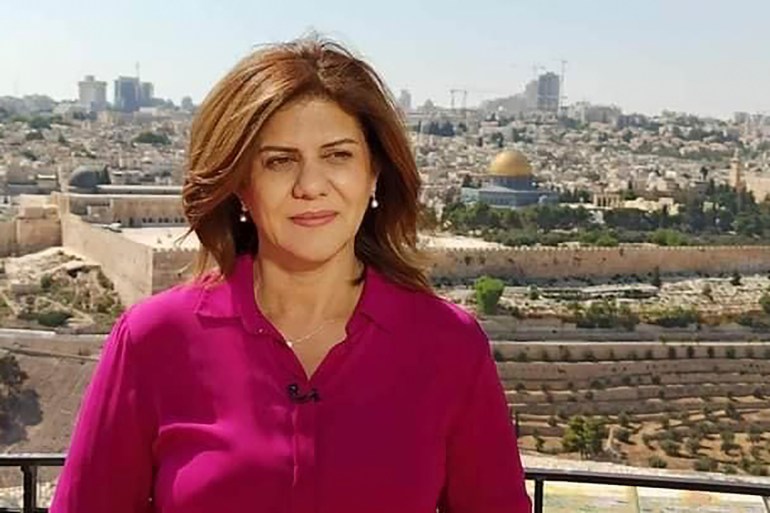Why Al Arabiya won't report more about Shireen Abu Akleh's death?
Politically, when we look about journalism, we may expect every journalist to have the same degree of respect to each other, even when their affiliation may complicate the matter.
Not this time though.
Shireen Abu Akleh, a Palestinian American journalist of Catholic background, had been shot dead by an unknown assailant on 11 May 2022, when she was covering news from Jenin, which had been recently besieged by the Israeli special forces hunting for Palestinians suspected of being terrorists. Her past was also interesting, she gained American citizenship from her maternal parents but she felt belonged to Palestine instead, and chose the journalist path. But in a faithful encounter, she enrolled herself to Al Jazeera in 1997. By that time, Al Jazeera was still a baby TV channel, established a year ago and used the staff from the already closed BBC Arabic branch in Riyadh that relocated to Qatar. And Shireen's role was far more important than expected: her journalist activities have made her a celebrity among Palestinians, and together popularised Al Jazeera into the most respected media institution in the Arab world. Over 40% of Palestinians watch Al Jazeera at home, the most of Arab media in the country, showing how much Al Jazeera, or at least Shireen, is for them.
But not everyone welcomes Shireen. Al Arabiya falls to the case.
The channel was a response to widespread onslaught by Al Jazeera in the past. Formed in 2003 by a Saudi businessman with deep ties to the Al Saud monarchy, the channel has become the second-most watched after Al Jazeera, and frequently presents an alternative, if not saying critical of Al Jazeera. Al Arabiya had several times lashed Al Jazeera for undermining Saudi Arabia and sponsoring terrorism. Al Arabiya, however, remains lagging behind to its Qatari rival, due to several reasons as underlined below:
- There is a clear independence between Al Jazeera and the Al Thani family, although this independence has a limit when it comes to the Qatari monarchy. As long as the channel doesn't move to the red line, it can operate freely, and thus Al Jazeera has been a very flexible channel, capable of making reports to the headline. Al Arabiya lacks such an institutional independence as it has to align to the Saudi diplomacy and thus, its reports have been seen as biased and pro-Saudi, as well as lacking depth.
- The internationalisation of Al Jazeera exceeds far than Al Arabiya. Despite the aim of Al Arabiya to topple Al Jazeera, so far, Al Jazeera's popularity has persisted. Al Jazeera doesn't limit in Arabic - it dares to expand in English, French, and even Serbo-Croatian and Turkish. Al Arabiya has only the Arabic channel in charge while English, Persian and Urdu language channels are yet to be launched due to complication. Henceforth, Al Jazeera has tons of international sharing agreements while Al Arabiya only has a few.
- Al Jazeera has become familiar to public because of its power to socialise with the communities in the Arab world, whose voices are still struggling to be heard. Instead of just going to a destination confirmed and protected, Al Jazeera journalists, like cases of Shireen, move to the depth of social life of the Arab world and other Muslim states. Al Arabiya's counterparts have largely failed to do so because of the Saudi influence that made their reports limited and most reports tend to be designated rather than independently made.
In some way, Al Jazeera becomes the media of the people of the Arab world because it meets what the public in there desperately want to speak out. Al Jazeera is definitely controversial in many ways, such as giving airtimes to Israeli officials, journalists accused of being terrorists or sympathetic to Islamists - but every international media outlet is the same, they can't escape controversies. And I can also attribute to Al Arabiya.
But Shireen's death has a bigger impact. Because of her role is far from beyond the media.
She was the first woman to join Al Jazeera and she worked when only a very few Arab women ever bother reporting. She inspired a generation of future Arab women to do the same and many attributed her as the pioneer of a social revolution in the region. At the same time, Al Jazeera's popularity became widespread because the media is not restricted to just one role, largely because of Shireen. It allows Al Jazeera to become highly popular and dozens of experienced journalists from the Arab world came to Doha for work because of it. Literally, a win-win situation.
Given the concept of relations between Saudi Arabia and Qatar have long been strained due to a number of events, notably during the Saudi blockade that lasted for four years (2017-2021), it is hard to believe Al Arabiya will ever want to shed sympathy for such a thing. Let's not forget, Saudi Arabia and her allies Egypt, the UAE and Bahrain used to jail Al Jazeera journalists or banned Al Jazeera from broadcasting.
This explains the dynamics of the Gulf countries and probably furthermore, the uncertainty toward the death of Shireen Abu Akleh, from the Saudi and Emirati viewpoint. Any sympathy offered to her from these nations maybe perceived as surrendering to Qatar, something these nations deeply despise. But her influence was so big for the Arabs that mentioning her name could evoke political concerns. So the best for Saudi Arabia and the UAE's Al Arabiya is simple: do not ignore, but downplay it. This is why reporters from Al Arabiya have not shared the same amount of solidarity, despite acknowledging the event, unlike the other Arab channels. Perhaps, in reality, it reveals the depth of Saudi and Emirati grievance toward Qatar has never been solved, and from Riyadh and Abu Dhabi's perspectives, "they have been forced to settle with Qatar for nothing".

Comments
Post a Comment